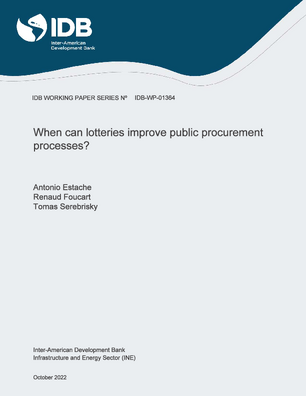When can lotteries improve public procurement processes?
Date
Oct 2022
We study the potential benefits of adding a lottery component to cut the main risks associated with standard negotiated and rule-based auction procurement procedures. We show that adopting a two stage approach in which bureaucrats first negotiate with a small number of bidders to assess their eligibility and, next, rely on a lottery to award the contract reduces corruption risks often observed in negotiated procedures. For rule-based procedures, we show that a “third-price lottery” in which the two highest bidders are selected with equal probability and the project is contracted at a price corresponding to the third highest bid can reduce limited liability, renegotiation, bid rigging and collusion risks.




